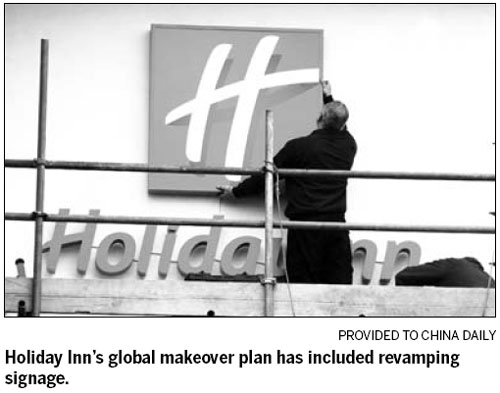However, the company periodically calls in the corporate chambermaids to let in some fresh air, and in China it is now doing just that.
Twenty-eight years after Holiday Inn arrived in Beijing, becoming the first foreign hotel in the mainland, its exotic novelty has become threadbare, and the company is setting about recasting the brand.
That is being achieved, it says, by targeting the country's middle class.

Those are the people that Nick Barton, its vice-president of sales and marketing for InterContinental Hotels Group Plc Greater China, which operates the Holiday Inn hotel chain, calls "everyday heroes".
"Holiday Inn is for people who want to relax; it is famous for its hospitality," he said. "It targets the middle class - people that work hard, long days, and just want to relax and stay in a comfortable place."
But recalibrating its market focus in China is just the latest of the chores IHG has set for itself in its Holiday Inn makeover.
In 2007, it began modernizing lobbies, room fittings and bathrooms and improving exterior lighting, landscaping and signage, a task that was not complete until three years later. Nearly $1 billion was spent on updating 3,200 hotels and 430,000 rooms worldwide. The relaunch cut the average age of Holiday Inn and Holiday Inn Express hotels to 10 years.
In August, just as it was catching its breath after blowing out the 60 candles on its birthday cake, Holiday Inn lit them up again as it rolled out the carpet at its 60th hotel in China, near Changbai Mountain, a ski resort in the northeast.
And the "big 6-0" flashed up once again as IHG revealed plans for that many new Holiday Inns in China over the next three to five years.
With the hotels it already has in the country, it now has 3,400 hotels worldwide and every day 275,000 people lay their heads on one of its pillows.
Just how important China is to IHG's expansion plans can be seen in a recent company report, which says 30 percent of the properties on its drawing board are in China. Building on 70 percent is already underway.
Across the country, IHG said, it opened 3,382 rooms in eight hotels in the six months ended Aug 7, taking its total number of rooms in the region to 58,184. Openings included two Crowne Plazas and five Holiday Inns, including the largest Holiday Inn in the world, in Macao, which has 1,224 rooms.
The group has about 5 percent of the global hotel industry and expects to double that over the next 20 years, with most of the growth in the United States, China and India, according to an interview with Richard Solomons, CEO of IHG on HotelNewsNow, the US-based industry website.
The strong resilience of the Chinese hotel market amid the global economic gloom has only reinforced IHG's confidence in China.
Euromonitor International, a research company in London, says global hotel industry revenue grew 9 percent to $457 billion last year, driven by the resurgence in business travel.
The Chinese hotel market was ranked as the world's second best performing, with sales increasing by $7.2 billion, just $200 million less than in the US.
Barton puts Holiday Inn's early success in China to the principle of the early bird catching the worm.
"We entered the Chinese mainland in 1984 with Holiday Inn Lido (in Beijing), and later opened in Qingdao and Chongqing, which were pretty much the best in town in the 1980s. We have a rich heritage in China, and among Chinese travelers, Holiday Inn is among the brands that they recognize most," he said.
"We have benefited a lot from our early entry. Now none of the other international brands has the experience and heritage to compete with us in the mid-scale range." But success can sometimes breed its own problems, and in the years after Holiday Inn arrived in China it created such a name for itself that it was beyond the reach of most Chinese.
Now, as international competitors swarm into the country, the brand is looking at its roots, those left by Kemmons Wilson, a home builder, when he opened the first Holiday Inn in Memphis, Tennessee, in 1952.
Wilson is said to have come up with the idea after a road trip with his family from Tennessee to Washington that left him disgruntled about dirty, cramped and expensive motels. His answer was simple: to provide comfortable accommodation that families could afford.
Within 20 years 1,400 Holiday Inns had opened worldwide and in June 1972 Wilson appeared on the front cover of Time magazine, branded as "the man with 300,000 beds".
But in 2012 it is not just bed numbers that are on Nick Barton's mind.
"Upscale hotels are being built everywhere, but I think you have to balance that with the rise of the mass middle class," he said.
With the expansion of the hotel market in China over the past 20 years, IHG has brought brands such as Crowne Plaza and InterContinental to China, but that has not devalued the Holiday Inn brand, Barton said. "I think Holiday Inn will continue to be seen as pretty premium. Although we position Holiday Inn as mid-scale, it is so well loved by Chinese customers."
In IHG's brand portfolio, Crowne Plaza is for executives building their careers on their way to success, people the IHG calls "strivers".
As for Holiday Inn, its overriding ethos is homeliness, Barton said, and there are no plans to change that.??
wangchao@chinadaily.com.cn
